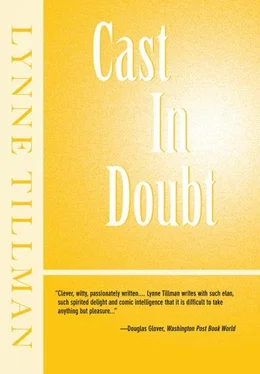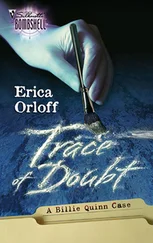I drive all morning, mulling over last night’s events. I let each one sink in thoroughly. Roman is an exquisite, even extravagant event. How is, I ask myself, a character like an event? I stop for souvlaki at a roadside café where I warmly greet the owner, whom I don’t know. I am in exceptionally good spirits. I am not at all hungry and nibble listlessly at the pita bread and meat. As any good Cretan will, the owner returns my solicitude with his own. He offers me a game of tavoli but I explain that I am in a rush. Frankly, I cannot concentrate. I merely glance at the open book before me, Stein’s lectures, and decide to follow the fastest route to the south, so as to arrive at my destination — that dot on the map — before nightfall.
The village that is nearest to the dot on Helen’s map probably does not have a guest house or inn. Often one can rent a room from a Greek family and indeed, when I arrive there, this is what I set about doing. I park the car on a deserted side street; there appear to be hardly any streets at all. I walk to the only store, a general store, that is open and ask for help. The young woman who owns the store has a room to let just below, in the basement, and so I am in luck. There is a restaurant a mere half mile from here and a beautiful beach, she tells me. Her name is Partheny, which means, curiously enough, “little virgin”; her husband is dead and she wears black, in the tradition of the Cretan widow, but I would guess she is only thirty. She also tells me there are many Americans who pass through, but yes, she believes she has recently seen one with a gold ring in her nose.
The village is a crudely built, almost barren place, not likely to be invaded by the hippies from the caves at M´tala, which is considerably south of here. It is such an unprepossessing, scrubby spot, with a few ratty flowers and trees dotting the cement sidewalks, I rue the fact that this is the setting for my rendezvous with Helen.
I move my car to a space in front of the store and carry my suitcase, groceries, liquor, and typewriter downstairs. The room is sparely furnished, but has a sink — the toilet is in the hall. There is just one light hanging from the ceiling but the sheets on the cot are clean enough. There is a table on which I place my typewriter. Quickly I remove it from its case, roll in a piece of paper, eager to bang out as fast as I can — my fingers are stiff — all the strange and marvelous events which have transpired since I left home.
Perhaps I ought this instant to go in search of Helen, but it is nearly dark. Also I am exhausted, having slept so little the last few nights. Might it have been Roman who undressed me and put my pajamas on me? I muse about this possibility — who else could it have been?
Overtired and somewhat frantic, I commit the following to paper: The large-screen television is on annoyingly all night. The children occasionally gather around it as if around a hearth. I am surprised that television is so central a part of their lives and I suppose I am even surprised by their having electricity. Roman has watched television all his life; his favorite programs come from America and he talks fluently of them. I admit I never watch it and he — they all — are astounded. At some point the old man calls out that the Gypsies are the smartest people on earth. And then he relates a tale to prove it. I can recall it only generally. Forty not-very-smart Gypsies were sent into a forest to do a job — cut down trees — and instead they bought sheep and used up all their money. Then they fell asleep, but no one Gypsy wanted to sleep on the outside of the circle, so all night they kept changing places, and by morning no one had slept. They lost their rope and axes; thirty-eight of them fell into a ravine and died. The other two — something dreadful happens to both. But the last — this is most amusing — the last dies because he wants to look at his private parts, which he has never seen. By now he is carrying a torch, but he leans so far forward, he falls off a bridge into a river and drowns. The Gypsies who died, says the old man, were the foolish ones, the scatterbrained ones. It is lucky they died, he says, for all the others who remained and didn’t go into the woods, they were the intelligent ones. All the stupid ones were gotten rid of, and that’s why the Gypsies are the smartest people on earth.
I pull the typewriter paper out of the machine.
The Gypsy’s desire to look at his genitals is something I’d never come upon before in a folktale. It could be, in a sense, derived from the Narcissus myth, but it’s base; rather its base is focused lower. It could also have to do with masturbation. My hand settles on my crotch, and I speculate, lazily, about whether they obey the same laws and prohibitions that oppressed me. I close the typewriter case, though I would prefer to linger and wander in the luscious maze Roman’s interest in me has provoked. But I can’t find the energy. Fully dressed, I lie down and fall into a blessed, restorative sleep.
After my nap, I wash, shave, splash cologne on my face, and change into clean clothes. Refreshed, I walk in the direction of the restaurant the little virgin mentioned. I have some anxiety that this might be the night I find Helen, and though I have been planning for this, or at least praying that it would happen, I haven’t the faintest idea what I will say to her. In truth I am unprepared, for what in the world should I say to her?
When I enter the restaurant, I find no one I recognize, just a few Greeks and several Germans.
I order taramosaláta, grilled fish, salad, and wine. The view is not spectacular, not mind-blowing, as John might say. I’d nearly forgotten him. I am relatively calm and eat the bread, which is fresh, and fish-roe spread, downing every mouthful with a gulp of cold, dry wine. My appetite is back. Just as the grilled fish arrives, the door opens. I stiffen, expecting it to be Helen. But it is not. I open my book and try to read, but a disquieting idea invades my overwrought brain.
If I don’t accept the Gypsy’s prophecy, or prophecy in general, ought I to continue to read about or study them? If I reject their ways and ideas, can I learn anything?
I drink more and continue along this mental path, which now engrosses me. For perhaps this is what the old Gypsy woman meant. If so, I tell myself, I am accepting at least some of her wisdom and ought to be allowed to go on. But didn’t T.S. Eliot become an Episcopalian, an Anglo-Catholic? Don’t most medievalists eventually convert to Catholicism? Jews, Protestants, all? It is a conundrum.
I make my home, my bed, in a rational world, but I awaken in an irrational one. That might be a good line for Stan Green, though perhaps too refined. Is it any less rational to consider accepting this, the Gypsy’s prophecy, for instance, than Eliot’s acceptance of God, his submission to faith? Perturbed, I rub my eyes. How is it possible to think about something one cannot or does not understand? Prophecy? The writing on Helen’s wall? My experience with the Gypsies has affected me. I hope it has made me a better person, a more human one. I sigh audibly. The Germans glance in my direction.
My dinner finished, and my exhaustion acute and abiding, I pay the bill. But courtesy demands that I meet the owner of the restaurant and his family. I explain where I am staying; at the mention of Partheny’s name, the owner’s wife lifts her head up sharply, indicating, in a Greek gesture, a strong no. I cannot inquire why. Probably she dislikes Partheny. Of course, a young and attractive widow is always feared in a small village. But that is not the story I wish to pursue. I do let them know I am pursuing Helen and describe her. They too think they have seen her, so I am certainly on the right track.
Читать дальше












